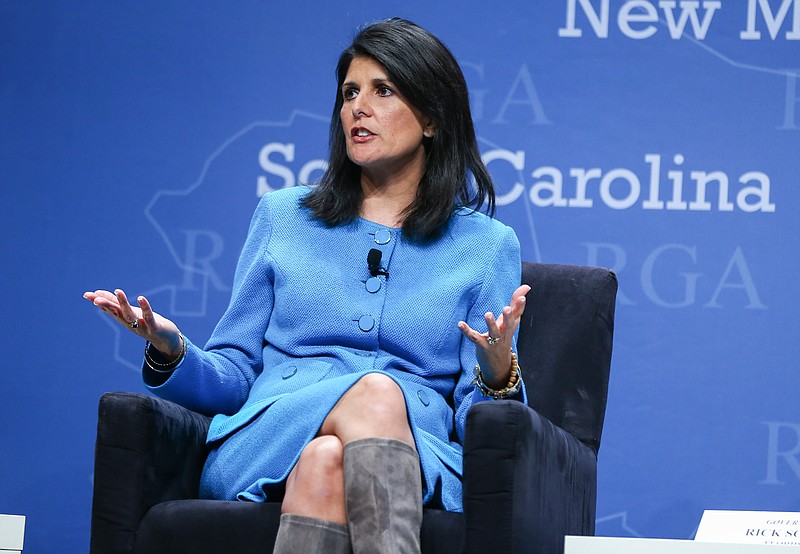LAS VEGAS -- Defiant Republican governors on Wednesday demanded the Obama administration suspend plans to resettle thousands of Syrian refugees in their states, charging that screening challenges make it all but impossible to identify terrorists among those seeking refuge in the United States so soon after a series of deadly attacks in Paris.
Also read
* Obama says GOP incitement on Syria refugees 'needs to stop' * Alabama's Robert Bentley says governors want answers on refugees * Georgia Gov. Deal stands by order to ban Syrian refugees * Experts say states lack legal authority to block refugees * Sohn: Religion is a poor litmus test for security or compassion * Georgia, Tennessee and Alabama move to stop accepting Syrian refugees * Group says Haslam, state lawmakers on 'wrong side of history' regarding Syrian refugees * Alabama Gov. Bentley directs state agencies to resist Syrian refugee relocation* Wary governors halt, question plan to accept Syrian refugees
State leaders from New Mexico to Michigan pleaded with the president to suspend the refugee program - at least temporarily. Others, including Republican governors from Texas and Indiana, claimed the legal authority to block the federal resettlement efforts unilaterally.
"We have the independent authority to completely shut down these refugee relocation programs," Texas Gov. Greg Abbott said in an interview with The Associated Press on the first day of the Republicans GovernorsAssociation two-day meeting in Las Vegas. "The states are saying we are not going to accept any more of these refugees until the United States comes up with an effective vetting program."
Despite the tough talk, it may not be that easy.
The Refugee Act of 1980 dictates that refugee resettlement within the United States is managed by the federal government. State refugee coordinators are consulted by the federal government and the nine refugee resettlement agencies that have contracts with the government, but that consultation is largely to ensure the refugees are settled in cities with adequate jobs, housing and social services.
Individual states do not have the legal authority to block refugee placement.
That didn't stop Indiana Gov. Mike Pence this week from issuing an executive order to block federal funding needed to administer the program.
"Posturing notwithstanding, this is a program that actually works on a collaborative basis between the federal government and states," Pence told reporters on Wednesday in Las Vegas. "What we've essentially said is 'we're not collaborating with you.'"
Pence encouraged Obama to reconsider his plan to veto legislation introduced by House Republicans to require new screening requirements for Syrian and Iraqi refugees before they're allowed into the United States.
Roughly 2,200 Syrian refugees have been allowed in over the last four years. The president has outlined a goal of bringing 10,000 more Syrian refugees to the U.S. during the current budget year.
Such refugees currently go through a comprehensive vetting process that can take as much as three years, including biometric screening, fingerprinting and additional classified controls. The House bill would add a requirement for the Homeland Security secretary, along with the head of the FBI and the Director of National Intelligence, to certify that each refugee being admitted poses no security threat.
The change "would provide no meaningful additional security for the American people, instead serving only to create significant delays and obstacles in the fulfillment of a vital program that satisfies both humanitarian and national security objectives," the White House said.
It's unclear whether the bill is enough to satisfy Republican governors even if it becomes law.
"If you really care about those people in Syria, why not take and put the resources in Syria instead of bringing hundreds of thousands of Syrians here?" South Carolina Gov. Nikki Haley asked.
The Islamic State group claimed responsibility for a series of attacks in Paris on Friday that left 129 people dead and hundreds wounded.
None of the suspects identified so far in the Paris attacks has been identified as a Syrian refugee and the German interior minister says the Syrian migrant passport found at the scene is likely a fake.
Michigan Gov. Rick Snyder encouraged his Republican colleagues to maintain a welcoming tone in the refugee debate. Some Republicans fear that GOP-led opposition to the president's plan includes traces of xenophobia, if not bigotry.
Snyder, for example, condemned Republicans who suggested that only Christian Syrians be allowed into the United States.
"I don't think that line's ever been drawn in our country's history. And I don't think that'd be an appropriate line to draw," he said in an AP interview.
But like his colleagues, the Michigan governor urged the president to "pause" the resettlement program until security concerns are addressed.
"I don't want to assume that there's a problem at this point. I just want to make sure we're doing the appropriate reviews," Snyder said. "It shouldn't be a real long pause."
